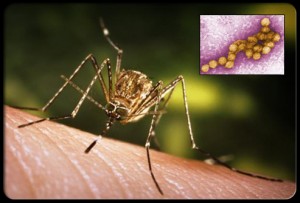 Here’s another reminder that there’s still a threat around the region from the West Nile Virus: a dead bird from Box Butte County has tested positive for the virus…the first infected bird found in Nebraska this year.
Here’s another reminder that there’s still a threat around the region from the West Nile Virus: a dead bird from Box Butte County has tested positive for the virus…the first infected bird found in Nebraska this year.
West Nile is passed through the bite of a mosquito that has picked up the virus by feeding on an infected bird, so Panhandle Public Health District Environmental Health Coordinator Tabi Prochazka says the dead bird and the positive mosquito pools in the area are a warning that the virus continues to pose a risk.
There are season-long mosquito trapping sites in four Panhandle counties. The PPHD monitors 18 mosquito pools in 3 counties and the Scotts Bluff County Health Department monitors several other pools in that county. 31 infected pools have been found in Scotts Bluff County, 14 in Sheridan, 6 in Dawes, and 2 in Garden County.
Both agencies also accept dead birds for West Nile testing, and citizens may call the PPHD at 308-487-3600 ext 107 or toll free at 866-701-7173 ext 107 to report a dead bird. Testing will be done on birds that have died within 24 hours, with no signs of maggots or rotting.
As of last Wednesday, the Nebraska Department of Health and Human Services had 22 confirmed human clinical cases of West Nile Virus in Nebraska this year. The agency’s map showed the Panhandle with between 1-and-3 cases, with earlier press releases identifying single cases in Sheridan and Scotts Bluff counties.
Prochazka says since the only way to get West Nile Virus is through a mosquito bite, the key to prevention is avoiding getting bitten. She urges residents to follow these simple precautions to protect themselves and their families.
· Use a mosquito repellant that has DEET.
· Wear long-sleeved shirts, long pants, shoes and socks.
· Take extra precautions when going outdoors at dawn and dusk when mosquitoes are most active.
· Get rid of standing water.
· Add larvicides to animal drinking troughs.
· Keep window screens in good condition.
